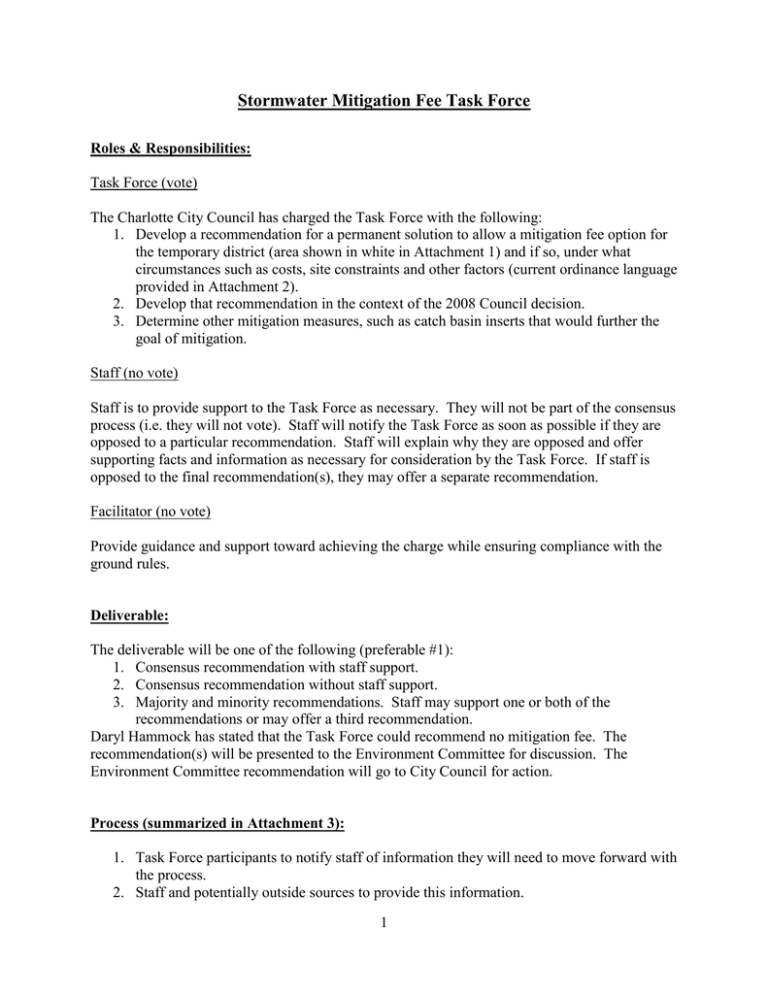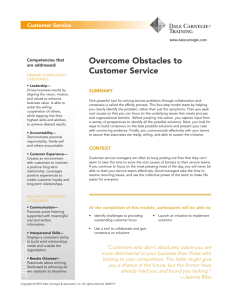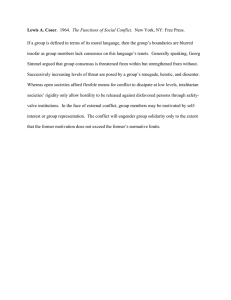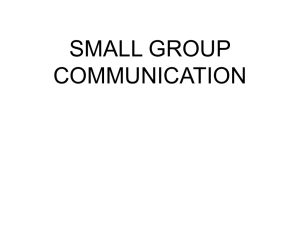Stormwater Mitigation Fee Task Force
advertisement

Stormwater Mitigation Fee Task Force Roles & Responsibilities: Task Force (vote) The Charlotte City Council has charged the Task Force with the following: 1. Develop a recommendation for a permanent solution to allow a mitigation fee option for the temporary district (area shown in white in Attachment 1) and if so, under what circumstances such as costs, site constraints and other factors (current ordinance language provided in Attachment 2). 2. Develop that recommendation in the context of the 2008 Council decision. 3. Determine other mitigation measures, such as catch basin inserts that would further the goal of mitigation. Staff (no vote) Staff is to provide support to the Task Force as necessary. They will not be part of the consensus process (i.e. they will not vote). Staff will notify the Task Force as soon as possible if they are opposed to a particular recommendation. Staff will explain why they are opposed and offer supporting facts and information as necessary for consideration by the Task Force. If staff is opposed to the final recommendation(s), they may offer a separate recommendation. Facilitator (no vote) Provide guidance and support toward achieving the charge while ensuring compliance with the ground rules. Deliverable: The deliverable will be one of the following (preferable #1): 1. Consensus recommendation with staff support. 2. Consensus recommendation without staff support. 3. Majority and minority recommendations. Staff may support one or both of the recommendations or may offer a third recommendation. Daryl Hammock has stated that the Task Force could recommend no mitigation fee. The recommendation(s) will be presented to the Environment Committee for discussion. The Environment Committee recommendation will go to City Council for action. Process (summarized in Attachment 3): 1. Task Force participants to notify staff of information they will need to move forward with the process. 2. Staff and potentially outside sources to provide this information. 1 3. Following the presentation of this information, a survey will be used to identify areas of agreement and disagreement with regard to the mitigation fee as well as to test potential recommendations for achieving consensus. The survey will also ask Task Force members to identify additional information they will need to deliberate toward reaching consensus. 4. Staff will consider the information needs identified in the surveys and may provide additional information prior to beginning deliberations. 5. Staff will use the information in the completed surveys to prepare recommendations for the Task Force to deliberate toward reaching consensus. Staff will also provide an opportunity for Task Force members to submit their own recommendations for deliberation. 6. Staff will present the recommendations to the Task Force for deliberation, including the pros and cons of each as appropriate. These pros and cons will be presented from an unbiased perspective using best available data. Staff will also explain their level of support for the recommendation. The Task Force will deliberate the recommendations toward reaching consensus. 7. If consensus is reached and staff determines that the charge has been fulfilled, then the process concludes. 8. If consensus is not reached, the Task Force will be asked Task Force members to identify data and information that will assist them in reaching consensus. 9. If consensus cannot be reached following the presentation of this data and information, the Task Force will receive alternative recommendations for deliberation. 10. If consensus is not reached, step #8 is repeated. 11. If consensus cannot be reached regarding the alternative recommendations, then minority and majority recommendations will be developed and the steps above repeated until consensus is reached and the charge is fulfilled. Consensus: An Understanding of Consensus 1. Consensus is reached when all members present can “live with” or “not object to” the proposal being made. 2. Consensus does not mean everyone gets everything they want. 3. Consensus is the methodology that allows collaborative problem solving to work. 4. Consensus is accepting that the decision is the best that could be made given the circumstances and the many participating interests. 5. Consensus requires the sharing of information, which leads to mutual education, which in turn, provides the basis for crafting workable and acceptable recommendations. 6. Consensus promotes joint thinking of a diverse group and leads to creative solutions. Also, because parties participate in the deliberation process, they understand the reasoning behind recommendations and are willing to support them. Determining Consensus 1. Vote by a show of hands. 2 2. Task Force members may indicate a conditional consensus (conditional on something else happening later). The condition is tabled until it is discussed later in the process. 3. A Task Force member who does not agree should offer changes to the language in the recommendation that would enable them to agree. This approach will be tested for consensus. 4. If a Task Force member decides that additional facts and information are needed for them to come to consensus, this must be stated and the information needed specified. 5. The recommendation will be tabled until the requested information is made available to the Task Force at which time the recommendation will be modified as necessary and tested for consensus. Ground Rules: 1. Show up and be prepared (Do your homework). 2. Treat each other, the organizations represented in the Group and the Group itself with respect at all times and put personal differences aside in the interest of the success of the Task Force. 3. Stick to the topics on the meeting agenda; be concise and not repetitive. 4. Work as team players and share all relevant information. Focus on honesty with tactfulness. Avoid surprises. Encourage candid, frank discussions. 5. Ask if you do not understand. 6. Openly express any disagreement or concern with all Task Force members. 7. Offer mutually beneficial solutions. Actively strive to see other’s points of view. 8. Follow through on commitments. 9. Share information discussed in the meetings with the organizations/constituents that you represent and bring back to the Task Force the opinions and actions of these constituents as appropriate. 10. Encourage free thinking and share relevant information with the Task Force. 11. Speak one at a time in meetings as recognized by the facilitator. 12. Everyone will participate but no one will dominate. 13. Agree that it is OK to disagree and disagree without being disagreeable. 14. Disagree in a constructive manner. 15. Make your statements and responses concise and to the point. 16. Support and actively engage in the Task Force decision process. Participants: Stormwater Mitigation Fee Task Force Members (Updated February 11, 2015) Member Representing Email Address Rusty Rozzelle Facilitator Rusty.Rozzelle@mecklenburgcountyn c.gov Voting Members Dr. Craig Allan Academic Representative, cjallan@uncc.edu University of North Carolina at Charlotte 3 Member Nancy Carter Roger Coates Carrie Cook Nate Doolittle Paisley Gordon, Jr. Sam Perkins David Robinson Rick Roti Eric Spengler Ken Szymanski Steve Wilson Dr. Jy Wu Shannon Binns Bill Daleure Rick Gaskins Patrick George Debra Glennon Bryan Holladay Kevin Vogel Joe Padilla Daryl Hammock Marc Recktenwald Mike MacIntyre Representing Email Address Charlotte Citizen Charlotte Citizen Charlotte Chamber of Commerce National Association of Industrial and Office Properties (NAIOP) Commercial Board of Realtors Catawba Riverkeeper Foundation Sierra Club (Central Piedmont Group) Charlotte Public Tree Fund Sustain Charlotte Charlotte Apartment Association Real Estate & Building Industry Coalition (REBIC) Academic Representative, University of North Carolina at Charlotte Alternates Sustain Charlotte Real Estate & Building Industry Coalition (REBIC) Catawba Riverkeeper Foundation Charlotte Public Tree Fund Charlotte Public Tree Fund Charlotte Apartment Association National Association of Industrial and Office Properties (NAIOP) Real Estate & Building Industry Coalition (REBIC) Staff Resources Charlotte-Mecklenburg Storm Water Services Charlotte-Mecklenburg Storm Water Services Charlotte-Mecklenburg Storm Water Services 4 N3157w@yahoo.com rrjcoates@yahoo.com ccook@charlottechamber.com ndoolittle@landdesign.com paisley@cpgrenc.com sam@catawbariverkeeper.org takahula@gmail.com rickroti@gmail.com eric@spengleraganslaw.com ken@greatercaa.org swilson@landworkspa.com jwu@uncc.edu shannon@sustaincharlotte.org bdaleure@avantgarderec.com rick@catawbariverkeeper.org patrick@charlottetreefund.org debra@charlottetreefund.org bryan@greatercaa.org KVogel@landdesign.com Joe.padilla@rebic.com dhammock@charlottenc.gov mrecktenwald@charlottenc.gov mmacintyre@charlottenc.gov Attachment 1 Mitigation Fee Option Areas 5 Attachment 2 Charlotte’s Post-Construction Ordinance Paragraph 18-161(c) (c) Redevelopment not within transit station areas or distressed business districts. For a period of time beginning with approval of this Ordinance amendment and ending December 31, 2017, projects involving redevelopment of existing built-upon-area and the cumulative addition of less than 20,000 square feet of new built-upon-area, are allowed by right to forego meeting the requirements of this article, except for required stream buffers and phosphorous requirements, provided one of the following measures is implemented on the site: (1) If an analysis of the downstream storm water conveyance system confirms that volume and peak control facilities may be waived by the Storm Water Administrator, provide 85 percent TSS removal from first inch of rainfall for entire project and pay the city a mitigation fee according to rates set forth in the administrative manual for the pre-project built-upon-area and any additional impervious area; or (2) If an analysis of the downstream storm water conveyance system confirms that volume and peak control facilities may be waived by the Storm Water Administrator, pay the city a mitigation fee according to rates set forth in the administrative manual for the pre-project built upon area and any additional impervious area; or (3) Provide one-year, 24-hour volume control and ten-year, six-hour peak control for entire project and pay the city a mitigation fee according to rates set forth in the administrative manual for the pre-project built-upon-area and any additional impervious area. 6 Attachment 3 Stormwater Mitigation Fee Task Force Process Information Provided Survey Used to Identify Areas of Agreement & Disagreement Staff Provides Additional Information As Needed Based on Survey Responses Staff Develops Recommendations Based on Survey Responses Staff Communicates Recommendations to Task Force Including Pros/Cons & Staff Position YES Consensus Reached? Staff Compiles Task Force Recommendation & Indicates Staff’s Position NO Additional Information Provided as Requested by Task Force Consensus Reached? Presentation to Environment Committee for Recommendation to City Council YES NO Alternative Recommendation Received Additional Information Provided as Requested by Task Force Consensus Reached? YES NO Consensus Reached? YES NO Subcommittee Develops Recommendation or Minority/Majority Positions 7 Consensus Tested


